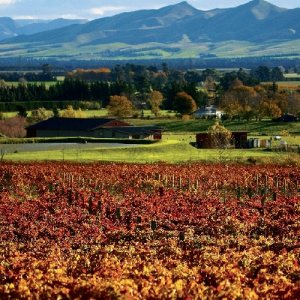Historically the farming area was dry sheep and crop, dominated by north-westerly winds and south-westerly weather.
It can be drought prone in the summer, and cool and dry in the winters, with low and very unpredictable rainfall.
The dominant land features are the eastern hills which shelter the valley from cool easterly winds from the ocean, a significant point of difference from most of the Canterbury plains. The soils in the Valley range from very light river gravels, clay, as well as clay limestone areas.
With such low rainfall and light soils in some places, water harvesting developed in the late 1970’s and early 80’s and offered the opportunity for pasture farmers to look to other crops. Three such farms diversified into grapes and with the support of Corbans Wines produced grapes commercially from 1986. Chardonnay, Riesling, Sauvignon Blanc and Cabernet were the initial plantings. However, it’s worth noting here that this was not the earliest venture into grapes in Waipara. One intrepid farmer had planted grapes on return from an overseas trip in the 1960’s but alas the young vineyard was destroyed by a flood. If it had not been devastated, its success would have changed the history of the region.
By the early 90’s other developments had taken place and two of the suppliers to Corbans completed their initial contract periods and opted to produce their own labels. The third farmer continued to supply Riesling and this was the fruit for the noted “Robard & Butler” Amberley Riesling, a regular medal winner at wine shows.
The region saw development, sometimes rapidly from the mid 90’s, both on a large and small scale. Investors set up projects that exploited soil types, wine styles, and the business models they were pursuing. Now, the vineyard plantings total more than 1800 hectares, with grapes spreading to Waikari, Hawarden, Hanmer and Cheviot.
Some of the larger vineyards are operated by Pernod Ricard, Waiata, Mt. Beautiful, Mudhouse, Southern Boundary Wines, Pegasus Bay, Crater Rim, and Greystone \ Muddy Water. In addition there are over 20 other producers of varying sizes.
Characteristically the region is one of producers, or growers intimately connected to producers. In other words the number of contract growers in the region is barely negligible.
The Waipara Valley is a mix of vineyard varieties and designs. Pinot Noir, Chardonnay, Riesling, Sauvignon Blanc, Gewürztraminer and Pinot Gris are prevalent. There are sprinklings of Cabernet, Merlot, Syrah, Tempranillo, Chenin Blanc and other minor varieties. Designs are varied from the old standard 3m rows by 1.8meter vine spacing down to 1.0m rows with variable vine spacing. Nothing is standard here!
These design variations have been motivated by growers to better utilize the land available to them, grow fruit that does not have excessive yields per vine and ultimately to be economic.
Fully committed to the Sustainable NZ programme, Waipara also has participants in the Organic Winegrowing initiative. The region has benefited from its commitment to the “Greening Waipara” project, teaming together Lincoln University, property owners and the Local District Council. Bio diversity plantings in vineyards and surrounding areas have enhanced our environment.
Waipara is now an established region with diversity amongst its producers and wines, and an important part of the story of New Zealand Wine. ν












